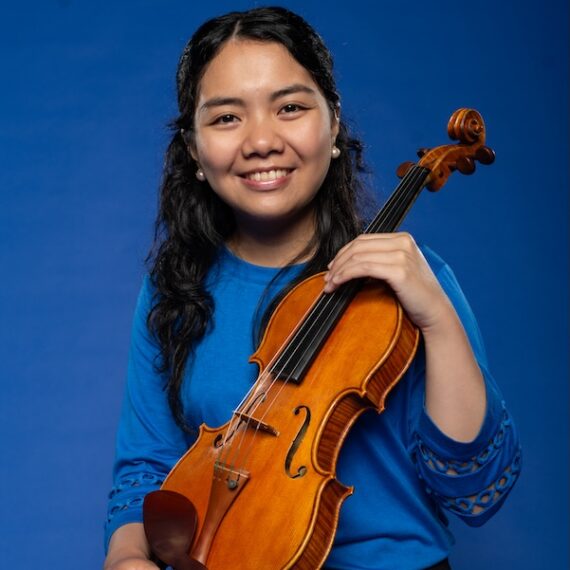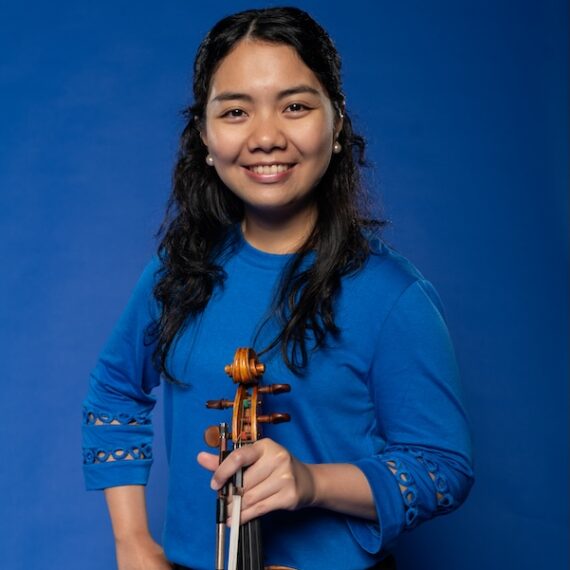Awards/Competitions
Top Prize, 2015 Philippine National Music Competition for Young Artists; Best Interpretation of Contest Piece, 2015 Philippine National Music Competition for Young Artists; 2nd Prize, 2005 Philippine National Music Competition for Young Artists
Appearances
The Florida Orchestra, substitute, 2024–present; New World Symphony, substitute, 2024–25; Civic Orchestra of Chicago, 2022–25; Illinois Symphony Orchestra, substitute, 2024–present; Ocala Symphony Orchestra, substitute, 2024–present; Filipino-American Music Foundation, 2022-present; Dame Myra Hess Memorial Concerts, 2024; Southwest Florida Symphony, substitute, 2024–25; Lira Ensemble of Chicago, 2023–25; Oistrakh Symphony of Chicago, 2023–25; Classical Music Chicago Rush Hour Concerts, 2023; WFMT Chicago’s Classical Music Radio Station, 2023–24; North Shore Chamber Orchestra, substitute, 2023; Northbrook Symphony, 2023–25; Chicago Summer Opera, 2023; Lincolnwood Chamber Orchestra, 2022–25; Chicago Classical Review, 2022; University of South Florida Symphony Orchestra, Concertmaster, 2021–22; Imperial Symphony Orchestra, Tampa, 2020; Cultural Players of the Philippines, Concertmaster, 2019; Philippine Philharmonic Orchestra, 2019; University of the Philippines Symphony Orchestra, 2012–19; DePaul Symphony Orchestra, 2017–19; Manila Youth Symphony Orchestra, 2013; Manila Symphony Orchestra, substitute, 2011; Philippine Research for Developing Instrumental Soloists (PREDIS), 2011–13
Was there a teacher who was particularly impactful/helpful? What made this instructor stand out?
All of my teachers are equally impactful to me, even if the times I spent with them differed. I owe everything I know now to all of them: Dr. Carolyn Stuart from the University of South Florida, Dr. Olga Kaler and Prof. I-hao Lee from DePaul University, and Prof. Antonio Molina from the University of the Philippines.
What is the most memorable performance you ever had?
The FilAm Music Foundation with Timothy Chooi. It was the first time the FilAm Music Foundation was able to put together a chamber orchestra of all-Filipino musicians and I both managed the ensemble and led as concertmaster. We played Vivaldi’s Four Seasons with Timothy Chooi, but what made it stand out was that my collaborators were great friends I’ve known from the Philippines and helped bring over to the U.S.
What is your proudest achievement as a musician?
Bringing my Manila-based quartet to the U.S. During Covid, I went back home and introduced them to my teacher, Dr. Carolyn Stuart. She gave us lessons over Zoom and was so impressed by their musicianship that at the end of the season she offered all of them graduate assistantship positions with a full-tuition waiver at the University of South Florida. One year later, we were reunited and went on to play concerts together in Florida and Chicago.
Is there a person or people you most respect in your field and why?
My teacher, Carolyn Stuart. She is not only a great teacher but also a kind and genuine person who always goes out of her way to make things as easy as possible for her students, especially the internationals. We still stay in touch and she has given me invaluable life advice that guides me until now.
Do you have a favorite non-classical musician or band?
I almost never listen to classical music for leisure. My favorite artists are Kenshi Yonezu, King Gnu, ONE OK ROCK, and Survive Said the Prophet. I also love listening to Filipino pop music artists such as Maki, IV of Spades, Cup of Joe, and Earl Agustin.
If you weren’t a musician, what would you be doing?
I would either be a visual artist or an anthropologist.
What is a surprising part of playing your instrument that you think most people don’t know?
You need to think like a scientist to be successful in it. Science and music aren’t opposing fields. Musicians are also like athletes in many ways. Both of these non-musical aspects of performing actually help me enjoy music-making a lot more.
What is the biggest challenge and/or surprise about playing in an orchestra?
Working with people who are inexperienced in ensemble-playing. No matter how skilled a musician is, there is a palpable difference between someone who has specifically played in an orchestra context for years versus someone who can play all the notes but never has their antennas up. More than knowing your own part, you must always be listening, watching, adjusting, and responding. With this kind of communication, playing is much more enjoyable.
What advice would you give your younger self or anyone starting out?
Keep going!
What do you wish you knew starting out that you know now?
It’s gonna take a very long time, but keep going!



